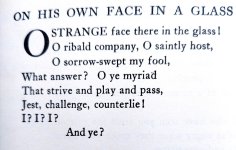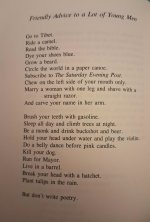You are using an out of date browser. It may not display this or other websites correctly.
You should upgrade or use an alternative browser.
You should upgrade or use an alternative browser.
American Artlessness
- Thread starter sus
- Start date
Benny Bunter
Well-known member
Quite big of Pound to finally admit that Whitman was his daddy even though he hated him.
luka
Well-known member
He sounds exactly like ufc fighter justin gathjeHave you heard his actual voice reading? It helps yes very charismatic voice wise
Benny Bunter
Well-known member
Benny Bunter
Well-known member
Wcw faux folksey voice is horrific too while we're at it
Gee whiz i sure love plums
I Know a Man
By Robert Creeley
As I sd to my
friend, because I am
always talking,—John, I
sd, which was not his
name, the darkness sur-
rounds us, what
can we do against
it, or else, shall we &
why not, buy a goddamn big car,
drive, he sd, for
christ’s sake, look
out where yr going.
mixed_biscuits
_________________________
Yes, they have that guileless quality that one may also find in a squirrel or a bee, for instance.'One comes across passages, even in very fine English poets, which makes one think: "Yes, very effective, but does he believe what he is saying?": in American poetry such passages are extremely rare.'
- W.H. Auden
mixed_biscuits
_________________________
Updike?
mixed_biscuits
_________________________
Robert Frost
Corpsey
bandz ahoy
I wonder if in America poetry was seen as an effeminate ponce's pasttime, even more so than in England
You have that certain strain in American literature of rugged masculinity
Maybe I'm channelling martin amis here, but think of all the big swinging dicks/dickheads of American literature, trying to whip out the great American novel
And how does this relate to guile? Guile could itself be seen as suspicious, dissimulation, "I have heard of your paintings too, well enough. God has given you one face and you make yourselves another" to quote John Wayne
Byron was a bit like this, in Don Juan — "isn't poetry a load of toss? i'll make my rhymes as weak as piss" and so on
You have that certain strain in American literature of rugged masculinity
Maybe I'm channelling martin amis here, but think of all the big swinging dicks/dickheads of American literature, trying to whip out the great American novel
And how does this relate to guile? Guile could itself be seen as suspicious, dissimulation, "I have heard of your paintings too, well enough. God has given you one face and you make yourselves another" to quote John Wayne
Byron was a bit like this, in Don Juan — "isn't poetry a load of toss? i'll make my rhymes as weak as piss" and so on
Benny Bunter
Well-known member
Robert Frost
There's no way you can call Frost artless, quite the opposite.
Benny Bunter
Well-known member
Whose woods these are I think I know.
His house is in the village though;
He will not see me stopping here
To watch his woods fill up with snow.
My little horse must think it queer
To stop without a farmhouse near
Between the woods and frozen lake
The darkest evening of the year.
He gives his harness bells a shake
To ask if there is some mistake.
The only other sound’s the sweep
Of easy wind and downy flake.
The woods are lovely, dark and deep,
But I have promises to keep,
And miles to go before I sleep,
And miles to go before I sleep.
His house is in the village though;
He will not see me stopping here
To watch his woods fill up with snow.
My little horse must think it queer
To stop without a farmhouse near
Between the woods and frozen lake
The darkest evening of the year.
He gives his harness bells a shake
To ask if there is some mistake.
The only other sound’s the sweep
Of easy wind and downy flake.
The woods are lovely, dark and deep,
But I have promises to keep,
And miles to go before I sleep,
And miles to go before I sleep.
jenks
thread death
I was thinking that about Frost too. He was determinedly a blank verse kind of bloke - if it is ‘conversational’ in anyway it’s not in an artless fashion. Ruminative and occasionally a little folksy possibly but not artless, not even studied artlesssness.There's no way you can call Frost artless, quite the opposite.
Benny Bunter
Well-known member
The magic of Frost is the subtlety. On the surface it seems simple and easy to read, but it has mysterious hidden depths and ironies, it's hard to figure out what he really means. And the lyrical ones like the one I just posted have an immortal quality to them, like they've always existed somehow. Supremely artful I would say.
sus
Moderator
jenks
thread death
Mending a Wall
BY ROBERT FROST
Something there is that doesn’t love a wall,
That sends the frozen-ground-swell under it,
And spills the upper boulders in the sun;
And makes gaps even two can pass abreast.
The work of hunters is another thing:
I have come after them and made repair
Where they have left not one stone on a stone,
But they would have the rabbit out of hiding,
To please the yelping dogs. The gaps I mean,
No one has seen them made or heard them made,
But at spring mending-time we find them there.
I let my neighbor know beyond the hill;
And on a day we meet to walk the line
And set the wall between us once again.
We keep the wall between us as we go.
To each the boulders that have fallen to each.
And some are loaves and some so nearly balls
We have to use a spell to make them balance:
‘Stay where you are until our backs are turned!’
We wear our fingers rough with handling them.
Oh, just another kind of out-door game,
One on a side. It comes to little more:
There where it is we do not need the wall:
He is all pine and I am apple orchard.
My apple trees will never get across
And eat the cones under his pines, I tell him.
He only says, ‘Good fences make good neighbors.’
Spring is the mischief in me, and I wonder
If I could put a notion in his head:
‘Why do they make good neighbors? Isn’t it
Where there are cows? But here there are no cows.
Before I built a wall I’d ask to know
What I was walling in or walling out,
And to whom I was like to give offense.
Something there is that doesn't love a wall,
That wants it down.’ I could say ‘Elves’ to him,
But it’s not elves exactly, and I’d rather
He said it for himself. I see him there
Bringing a stone grasped firmly by the top
In each hand, like an old-stone savage armed.
He moves in darkness as it seems to me,
Not of woods only and the shade of trees.
He will not go behind his father’s saying,
And he likes having thought of it so well
He says again, ‘Good fences make good neighbors
BY ROBERT FROST
Something there is that doesn’t love a wall,
That sends the frozen-ground-swell under it,
And spills the upper boulders in the sun;
And makes gaps even two can pass abreast.
The work of hunters is another thing:
I have come after them and made repair
Where they have left not one stone on a stone,
But they would have the rabbit out of hiding,
To please the yelping dogs. The gaps I mean,
No one has seen them made or heard them made,
But at spring mending-time we find them there.
I let my neighbor know beyond the hill;
And on a day we meet to walk the line
And set the wall between us once again.
We keep the wall between us as we go.
To each the boulders that have fallen to each.
And some are loaves and some so nearly balls
We have to use a spell to make them balance:
‘Stay where you are until our backs are turned!’
We wear our fingers rough with handling them.
Oh, just another kind of out-door game,
One on a side. It comes to little more:
There where it is we do not need the wall:
He is all pine and I am apple orchard.
My apple trees will never get across
And eat the cones under his pines, I tell him.
He only says, ‘Good fences make good neighbors.’
Spring is the mischief in me, and I wonder
If I could put a notion in his head:
‘Why do they make good neighbors? Isn’t it
Where there are cows? But here there are no cows.
Before I built a wall I’d ask to know
What I was walling in or walling out,
And to whom I was like to give offense.
Something there is that doesn't love a wall,
That wants it down.’ I could say ‘Elves’ to him,
But it’s not elves exactly, and I’d rather
He said it for himself. I see him there
Bringing a stone grasped firmly by the top
In each hand, like an old-stone savage armed.
He moves in darkness as it seems to me,
Not of woods only and the shade of trees.
He will not go behind his father’s saying,
And he likes having thought of it so well
He says again, ‘Good fences make good neighbors
jenks
thread death
Out, Out–
Robert Frost1874 – 1963
The buzz-saw snarled and rattled in the yard
And made dust and dropped stove-length sticks of wood,
Sweet-scented stuff when the breeze drew across it.
And from there those that lifted eyes could count
Five mountain ranges one behind the other
Under the sunset far into Vermont.
And the saw snarled and rattled, snarled and rattled,
As it ran light, or had to bear a load.
And nothing happened: day was all but done.
Call it a day, I wish they might have said
To please the boy by giving him the half hour
That a boy counts so much when saved from work.
His sister stood beside them in her apron
To tell them "Supper." At the word, the saw,
As if to prove saws knew what supper meant,
Leaped out at the boy's hand, or seemed to leap—
He must have given the hand. However it was,
Neither refused the meeting. But the hand!
The boy's first outcry was a rueful laugh,
As he swung toward them holding up the hand
Half in appeal, but half as if to keep
The life from spilling. Then the boy saw all—
Since he was old enough to know, big boy
Doing a man's work, though a child at heart—
He saw all spoiled. "Don't let him cut my hand off—
The doctor, when he comes. Don't let him, sister!"
So. But the hand was gone already.
The doctor put him in the dark of ether.
He lay and puffed his lips out with his breath.
And then—the watcher at his pulse took fright.
No one believed. They listened at his heart.
Little—less—nothing!—and that ended it.
No more to build on there. And they, since they
Were not the one dead, turned to their affairs.


